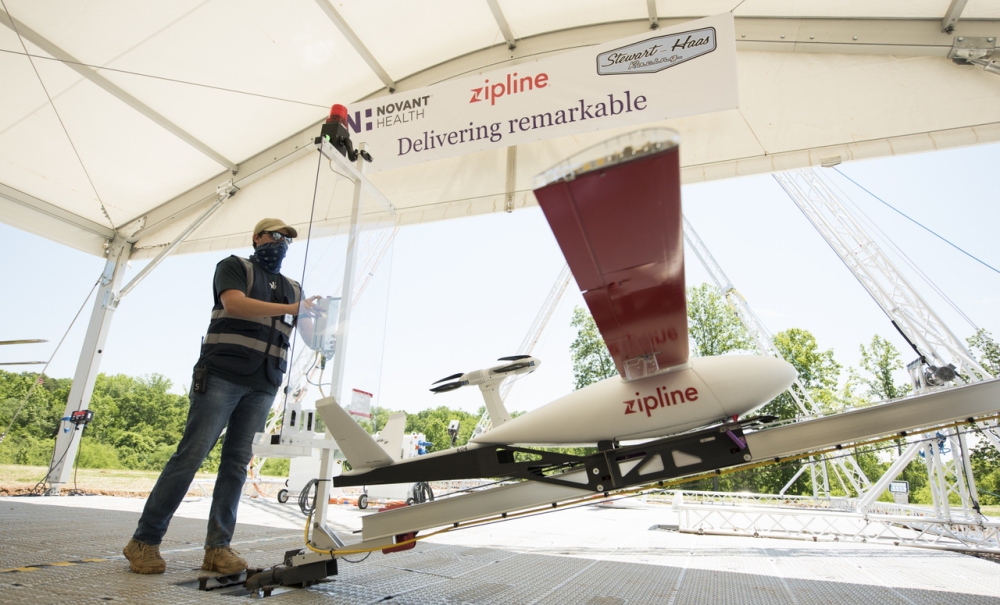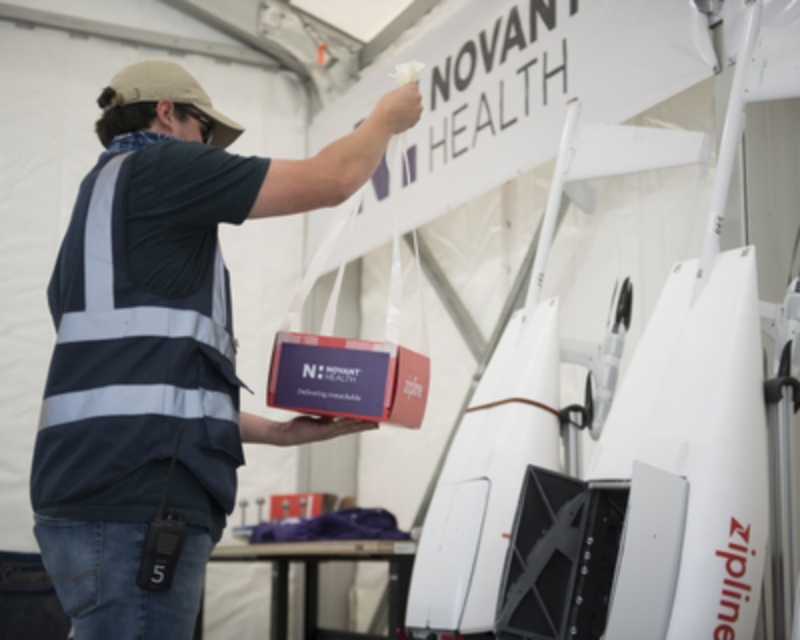health care system is the first organization in the U.S. to be granted a Part 107 waiver by the U.S. Federal Aviation Administration (FAA) to use drones for distribution of medical supplies for COVID-19 pandemic response.
Plans call for starting operations with contactless, distribution of personal protective equipment (PPE) and other medical supplies to Novant Health’s medical campuses. The service is a partnership with Zipline International Inc., the world’s only on-demand drone logistics service.
Over the next two years, the partnership plans to expand beyond emergency operations in the Charlotte area to regular commercial operations, subject to approval under FAA Part 135 rules, to serve health facilities and, ultimately, patients’ homes across the state. Novant Health and Zipline’s partnership seeks to create a next-generation model for health system logistics leveraging contactless drone deliveries.
Novant Health began test flights in late May and the first drops were made to Novant Health Huntersville Medical Center as authorized by the FAA. The battery-powered drones take off and land from an emergency distribution center near the Novant Health Logistics Center in Kannapolis, North Carolina on land on the Stewart-Haas Racing campus, which donated use of the land.
Initially, Novant Health has been authorized to move medical supplies by drone between the hangar and a drop zone near Novant Health Huntersville Medical Center. The flights between Kannapolis and Huntersville range from 20 to 30 miles round trip, and Novant Health expects to expand operations to other medical center campuses.
“Novant Health has long been on the forefront of leveraging technology to enhance how health care is delivered to our patients,” said Angela Yochem, Novant Health executive vice president and chief digital and technology officer. “The COVID-19 pandemic has tasked us with being even more nimble and innovative in how we solve for complex challenges. Fast-tracking our medical drone delivery capability is just one example of how we’re pioneering in an industry notoriously resistant to change. We are very grateful to the FAA and North Carolina’s DOT for their help to expedite the process during this unprecedented time. ”
Zipline drones can travel 100 miles round trip, fly autonomously and can carry close to four pounds of cargo. The drones can reach speeds of up to 80 miles an hour, even in high winds and rain. The drone descends to a safe height and drops its package by parachute to a designated landing spot.
Initially, the drones will distribute protective equipment such as masks, gowns, and gloves. However, the logistics service is positioned to adapt quickly to the evolving COVID-19 pandemic and may potentially help with testing, drug trials, and vaccine distribution.
The operation in North Carolina is possible through the support of the FAA’s Unmanned Aircraft System Integration Pilot Program and the leadership of the North Carolina Department of Transportation (NCDOT).
This is groundbreaking approval to operate drone flights in airspace normally restricted to commercial, manned aircraft. Zipline’s drones have flown more than 2 million miles, made tens of thousands of on-demand medical deliveries to patients in need in multiple countries around the world.
In 2018, Zipline began working with the U.S. Department of Defense — both in the United States and Australia — to demonstrate how its technology could help transform emergency medicine and critical care during health crises like the COVID-19 outbreak, war, as well as humanitarian and disaster relief scenarios.
Source: Press Release


